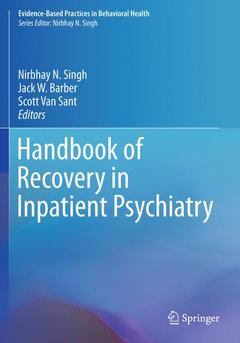Handbook of Recovery in Inpatient Psychiatry , 1st ed. 2016 Evidence-Based Practices in Behavioral Health Series

- Sexuality and sexual health in the inpatient psychiatric setting.
- The power of stigma and the usage of SAMHSA (Substance Abuse and Mental Health Services Administration) principles to combat stigma.
- Legal advocacy.
- Self-advocacy and empowerment.
- Methods to enhance resilience and sustain recovery in inpatients.
- Common errors and solutions during the transformation to recovery-oriented systems.
Details how recovery can form the backbone of clinical practice in inpatient psychiatry
Explores various interventions across a broad spectrum of inpatient psychiatric care of individuals with severe mental illness
Examines foundational aspects of inpatient recovery, including its definitions, principles, research, and applications
Addresses issues involved in positive transformation of public mental health hospitals?
Includes supplementary material: sn.pub/extras
Date de parution : 06-2018
Ouvrage de 467 p.
17.8x25.4 cm
Disponible chez l'éditeur (délai d'approvisionnement : 15 jours).
Prix indicatif 84,39 €
Ajouter au panierDate de parution : 09-2016
Ouvrage de 467 p.
17.8x25.4 cm
Disponible chez l'éditeur (délai d'approvisionnement : 15 jours).
Prix indicatif 295,39 €
Ajouter au panierThème de Handbook of Recovery in Inpatient Psychiatry :
Mots-clés :
Applications of recovery principles; Assessment of inpatient recovery; Behavioral services and recovery; Cognitive remediation services and recovery; Definitions of inpatient recovery; Family and recovery; Forensic services and recovery; Inpatient psychiatric recovery principles; Inpatient psychiatric recovery research; Legal advocacy and recovery; Psychiatric services and recovery; Psychopharmacological treatment and inpatient recovery; Public mental health hospitals and recovery; Recovery and sexual health; Recovery and sexuality; Recovery-focused inpatient treatment planning; Rehabilitation services and recovery; Self-advocacy and recovery; Shared decision making and recovery; Vocational and employment training and recovery



